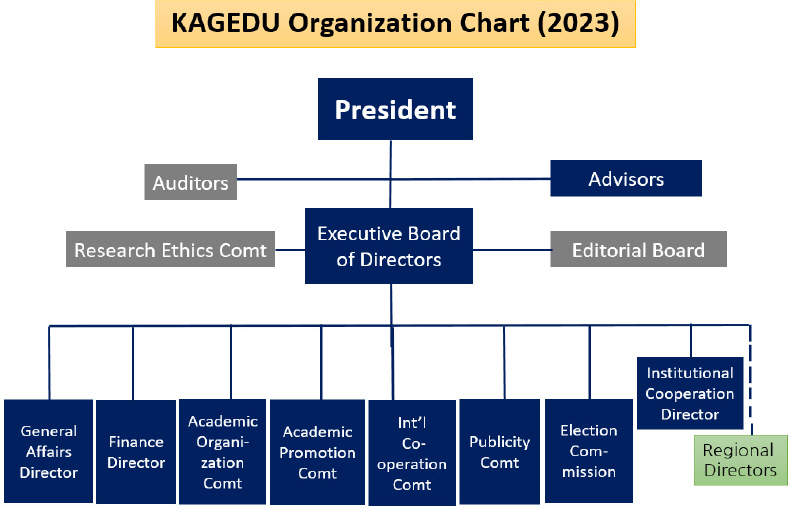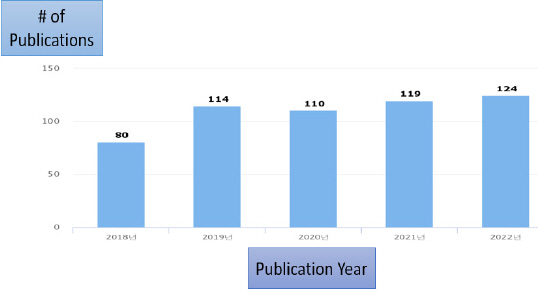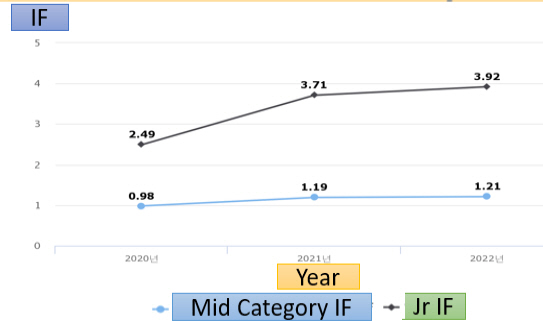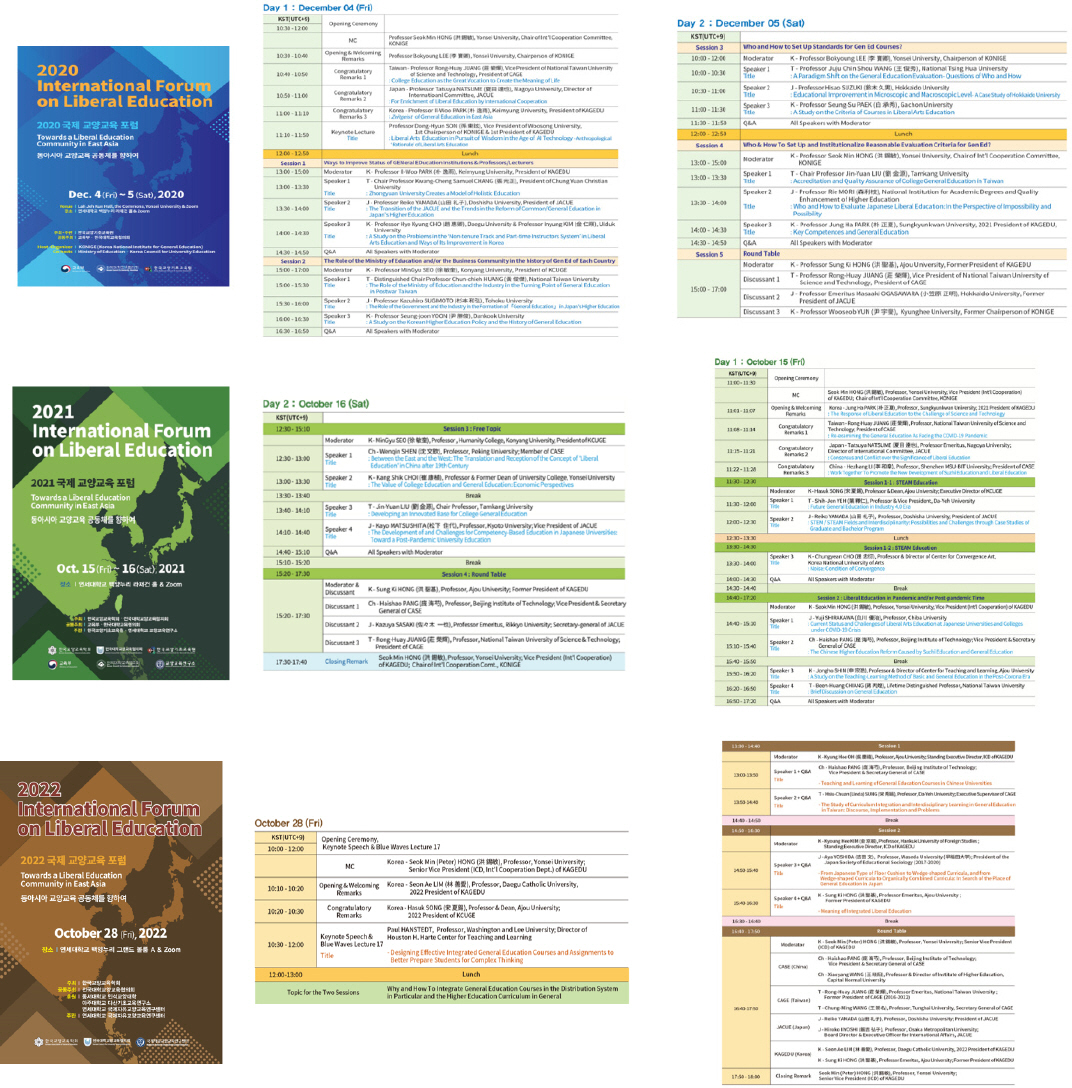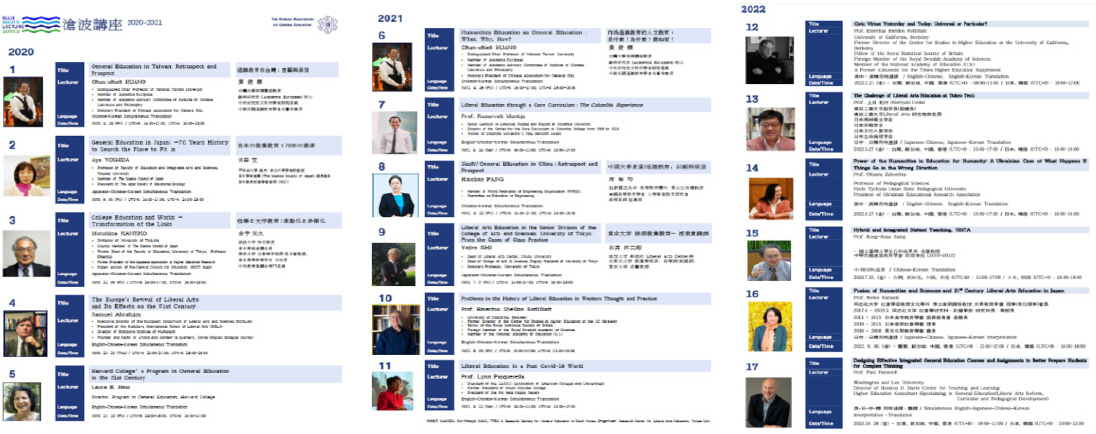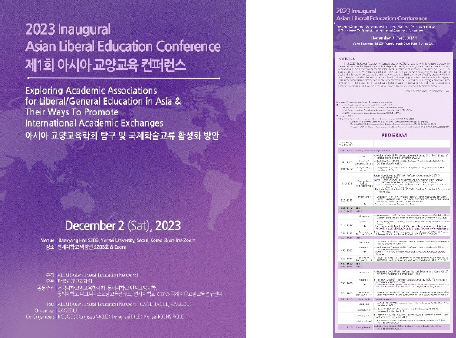한국교양교육학회 -역사, 구성, 그리고 국내 및 국제 학술 교류 활동
The KAGEDU : Its History, Structure, and Domestic and International Academic Exchange Activities
Article information
Abstract
본 논문은 먼저 명실공히 한국 교양교육학계를 대표하는 한국교양교육학회의 설립(2006) 역사와 발전과정을 전국대학교양교육협의회(2001, 이하 협의회)와 한국교양기초교육원(2011, 이하 교기원)과의 밀접한 협력관계 속에서 고찰했다. 이어서 본고는 학회 구성원들의 숫자와 특성 및 학회를 구성하고 운영하는 조직들의 특색과 운영 원칙들, 그리고 이들간의 상관관계에 대해서 자세히 살펴봤다. 다음으로, 본고는 NRF 등재학술지인 이 학회의 『교양교육연구』(2007)가 교양교육 전 분야를 망라하는 국내 유일의 전국단위 학술지로서, 발행 간기와 발행 논문 수, 영향력 지수 면에서 압도적 1위를 기록하면서, 교양교육 분야의 국내 최고의 공론장 역할을 충실히 수행하고 있음을 확인했다. 한편, 본고는 한국교양교육학회의 국내 학술활동(춘⋅추계 전국학술대회, LACs, 세미나 21, 교양교육 총서 시리즈 출판, 교양교육 분야 우수 도서 선정 사업)과 국제학술교류를 위한 활동들(국제학술대회, 창파강좌, Libeducol 개최)의 주요 특성도 자세히 다루고, 특히 2023년 말에 한국교양교육학회 주도로 결성하고 개최한 ALEN(Asian Liberal Education Network)과 제1회 ALEC(Asian Liberal Education Conference)이 2018년 이후 본 학회가 동아시아 교양교육 분야의 허브로서 추진해온 아시아 공동의 국제학술 교류 노력의 매우 의미 있는 결실을 상징한다고 평가했다. 끝으로, 본고는 한국교양교육학회가 해결해야 할 과제들을 학회가 협의회와 교기원과 맺고 있는 상호관계의 긍정적⋅부정적 측면, 재정적 독립성, 행정의 근대화, 학술지의 연구 결과와 연구 인력의 기초학문분야 간 불균형, 차세대 연구자 육성 면에서 검토한 후, 아시아 공통의 교양교육대학 설립을 포함한 국제학술교류 증진 방안들을 제안했다.
Trans Abstract
This paper first examines the history and development of the Korean Association of General Education (hereafter KAGEDU, 2006), which represents the Korean liberal/general education community, in the context of its close relationship with the Korean Council for University General Education (hereafter KCUGE, 2001) and the Korea National Institute for General Education (hereafter KONIGE, 2011). It then examines in detail the number and characteristics of the KAGEDU’s members as well as its constituent organizations, operating principles, and the interrelationships among them. Next, this paper finds that the KAGEDU’s The Korean Journal of General Education (hereafter KJrGE, 2007), a first-class academic journal recognized by the NRF (National Research Foundation) of Korea, is a unique national academic journal in Korea that encompasses all aspects of liberal/general education. It is an outstanding leader in terms of publication frequency, number of published articles, and influence index, dominating its field. As a result, the Journal serves as the best public platform for liberal/general education in Korea. This paper also deals with the main features of the KAGEDU’s domestic academic activities (Spring and Fall National Conferences, LACs, Seminar 21, Publication of ‘Collected Works of Liberal Education Classics,’ and Selection of Excellent Books) and its activities for international academic exchange (holding international forums and conferences, Blue Waves Lectures, and Libeducols). In particular, it explains that the KAGEDU initiated the establishment of the Asian Liberal Education Network (ALEN) and the holding of the first Asian Liberal Education Conference (ALEC) in late 2023. According to this paper, the two academic events symbolize a very significant outcome of the joint Asian international academic exchange efforts that the KAGEDU, as the hub for liberal education in East Asia, has been leading since 2018. Finally, this article examines the challenges facing the KAGEDU in terms of the ambivalent effects of its relationship with the KCUGE and the KONIGE, its financial independence, modernization of its administration, its under-researched areas, and its need to nurture the next younger generation of scholars. Then, it proposes measures to promote international academic exchange including the establishment of a common Asian liberal education university/college.
1. Identity and Foundation
The Korean Association of General Education (KAGEDU, 韓國敎養敎育學會) founded in 2006 is a pure educational and academic organization that represents liberal/general education in Korea in both name and reality. However, the development of liberal/general education in Korea is not led by the KAGEDU alone; it is carried out by the Association and its two closely related organizations together.
One is the Korean Council for University General Education (KCUGE, 全國大學敎養敎育協議會) which was established in 2001 as a nationwide association of the deans of university colleges (or general education colleges) across the country. In the early 21st century, the Korean Ministry of Education declared that it would provide financial support to universities that would establish university colleges (or general education colleges) and reform general education curricula. This initiative, supported not only by university administrators who wanted financial support from the government but also by forward-thinking professors who wanted to reform general education of their universities, led to the establishment of university colleges or general education colleges throughout the country. As a result, the KCUGE was founded in 2001 as an association of the deans of these university colleges or general education colleges (Son, 2020, pp. 8-9, and see also Min, 2020; Yoo, 2020).
However, the KCUGE faced challenges in maintaining its activities including its biennial symposium as well as its continuity, mainly due to the limited tenure of its college deans (2 years). On October 10, 2006, the KCUGE established the KAGEDU as its own sister organization not only to address these issues but also to promote diverse medium- and long-term academic research in liberal/ general education and to disseminate its research results (Son, 2020, pp. 9-13).
The other organization is the Korea National Institute for General Education (KONIGE, 韓國敎養基礎敎育院). It was established in 2011 as a government-funded but autonomous organization independent of the government in order to support the development of liberal/general education throughout the country. It consists of a Chairman and 3-4 staff members. The KONIGE implements many government-funded projects related to liberal/general education. However, since it has no research staff of its own, the KAGEDU provides it with the manpower to implement these projects.1)
The KAGEDU, with the cooperation of the KCUGE and the KONIGE, has played the leading role in the development of liberal/general education in Korea by conducting academic research on liberal/general education and disseminating its research results as well as by providing the future visions of liberal/general education.
2. Membership and Structure2)
2.1. Membership
As of November 15, 2023, the KAGEDU has about 2,373 web members who participate in liberal/general education in Korea. These members include scholars and educators who are involved in or academically related to liberal/general education in Korea. They are mainly from university colleges, general education colleges, departments of liberal arts, and various liberal/general education (research) centers within universities or colleges.
Regarding the membership fees for the KAGEDU,
the entrance fee is set at 30,000 Korean Won, and
the annual membership fee is also 30,000 Korean Won.
There is an option for a lifetime membership at a cost of 500,000 Korean Won.
2.2. Structure as of 2023 (See Figure 1)
The KAGEDU is composed of the Executive Team, the Editorial Board, the Research Ethics Committee, the Executive Board of Directors, the Auditors, and the Advisors, and all positions except the Auditors are appointed and discharged by the President.
2.2.1. The Executive Team is Composed of the Following Bodies
① Executive Branch (執行部)
The Executive Branch shall consist of the President (elected annually and eligible for re-election for two consecutive terms), the General Affairs Director and the Finance Director.
② Committees (委員會)
The various committees oversee diverse domestic and international academic activities, publicity, and the annual election of the president. The Academic Organization Committee organizes the National Academic Conference, which is held twice a year. The Academic Promotion Committee plans and conducts domestic academic research activities other than the National Academic Conference, while the International Cooperation Committee oversees international academic exchanges such as international conferences/forums and Libeducol (Liberal Education Colloquium). In addition, the Publicity Committee publicizes the scholarly activities of the KAGEDU and its members as a whole, and the Election Commission oversees the annual election of the President, who appoints the immediate past President as its chairperson.
③ Institutional Cooperation Director (機關協力理事)
Among the two aforementioned organizations that closely cooperate with the KAGEDU, the President of the KCUGE shall by default serve as the Institutional Cooperation Director for the KAGEDU and cooperate with its work.
④ Regional Directors (地域理事)
The Regional Directors shall focus on the development of liberal/general education in each region they represent in Korea.
2.2.2. Editorial Board (編輯委員會) and Research Ethics Committee (硏究倫理委員會)
Although all members of these two committees are appointed by the President, they shall operate as separate organizations, independent of the President and the Executive Branch. The Editorial Board is responsible for the publication of the KAGEDU’s academic Journal, and the Research Ethics Committee oversees the research ethics compliance of all articles published in the Journal. Both the independence and the commitment to research ethics contribute to the higher quality of the Journal.
2.2.3. Executive Board of Directors (常任理事會)
The Executive Board of Directors is the supreme decision-making body of the KAGEDU and is composed of the Executive Branch, the vice presidents and the chairpersons of various committees, except for the Regional Directors (2.2.1.④) (Refer to the bodies in 2.2.1. and 2.2.2. mentioned above).
2.2.4. Auditors (監査委員)
Two Auditors elected by the General Assembly (總會) shall audit the affairs and accounts of the Executive Branch (or the Executive Team, if necessary), also acting independently of the President and the Executive Branch.
2.2.5. Advisors (諮問委員)
The Advisors are composed of former presidents of the KAGEDU and provide advice for the Executive Branch.
3. KAGEDU’s Academic Journal, The Korean Journal of General Education, ISSN 1976-3212, e-ISSN 2714-11013)
This Journal was founded in 2007 by the KAGEDU and acquired in 2016 the status of the first-class academic journal recognized by the NRF (National Research Foundation) of Korea under the Ministry of Education. The Journal has 6 issues per year. As of October 2023, it has published 75 issues in 17 volumes with nearly 1,200 articles. In recent years, the Journal has received an average of 200 submissions per year. In 2019, the Journal published 114 articles, followed by 110 in 2020, 119 in 2021, and 124 in 2022 (See Figure 2). Between 2020 and 2023, its acceptance rate for submitted articles was 60.2%.
As of 2023, the Journal ranks first in the influence index among the 142 academic journals in the field of multidisciplinary science, and tenth in the same index among a total of 2,757 academic journals, both of which are registered with the NRF (See Figure 3). In addition, the Journal ranks second among Korean-language journals in Google Scholar search statistics for 2018-2022 (See Figure 4).
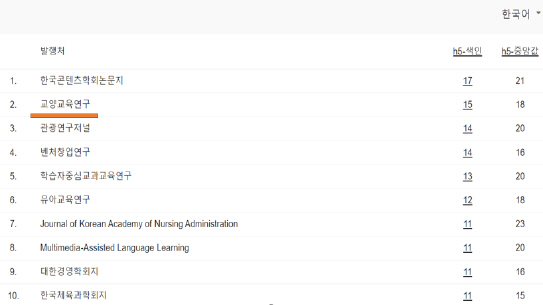
Google Scholar Search Statistics: The Korean Journal of General Education ranks 2nd among Korean journals (Google Scholar, 2023).
From April 2020 on, the Journal began publishing in an e-journal format with Volume 14, Number 2, in response to an increasing demand for greater digital accessibility. The Journal is preparing to become a Scopus-quality journal.
The Korean Journal of General Education is a unique national academic journal in Korea that encompasses all aspects of liberal/general education. It is an outstanding leader in terms of publication frequency, number of published articles, and influence index, dominating its field. As a result, the Journal serves as the best public platform in Korea for producing and disseminating a wide and diverse range of research findings in liberal/general education.
4. Academic Activities4)
4.1. Domestic Academic Activities
4.1.1. Holding a National Conference Twice a Year since 2007
Since 2007, the KAGEDU has held two national conferences every year, one in the spring and the other in the fall, and these conferences currently serve as the center of academic activities in the field of liberal/general education in Korea.
4.1.2. LAC (樂, Liberal Arts Colloquium, 2021~)
The KAGEDU has been holding eight LACs (Liberal Arts Colloquium) every year since 2021. Each time, the LAC invites one prominent domestic scholar from various fields in Korea to give lectures and discuss various issues related to liberal/general education. In 2023, 10 scholars were invited for five LACs which focused on interrelated topics in order to provide a venue for more in-depth lectures and discussions. (In fact, the LAC, a lecture series inviting domestic experts, began as a counterpart to the Blue Waves Lecture, one inviting international speakers, which will be explained in detail below.)
4.1.3. Seminar 21
From 2021 to 2022, the KAGEDU held a seminar to study the history and the ideology of the university about 10 times a year. However, in 2023, due to complicated reasons, the KONIGE organizes this seminar.
4.1.4. Publication of ‘Collected Works of Liberal Education Classics’
Since 2022, the KAGEDU has been translating and publishing a series of ‘Collected Works of Liberal Education Classics’ in an e-book format. The German edition was published in 2022 and the British edition in 2023. This project will continue for quite some time.
4.1.5. Selection of Excellent Books
Since 2019, the KAGEDU has been selecting excellent books in the field of liberal/general education every three years and holding an award ceremony at the Fall National Academic Conference in November of the every third year as long as there are any winners.
4.2. International Academic Exchange Activities
4.2.1. International Academic Forums and Conferences (Hong, 2020, pp. 48-50)
In Korea, the first international forum on liberal/general education was held at Chonnam National University in 2014 as part of a government-funded project, but it was subsequently discontinued. In 2018, both an international forum and an international conference were held offline on a global scale, and in 2019, an offline forum was held with the participation of mostly Asian scholars. In 2020-2021, due to the impact of the coronavirus pandemic, international forums were held online. In 2022, an international forum was held in a blended format (i.e., online and offline at the same time) (See Figure 5).
4.2.2. 17 Blue Waves Lecture Series (2020-2022) (Hong, 2020, pp. 50-52)
In 2020-2022, when the coronavirus pandemic made it difficult for international academic exchanges to take place on a face-to-face basis, the KAGEDU launched the online Blue Waves Lecture Series, which successfully held 17 lectures during this period. The series featured distinguished scholars in the field of liberal/general education from Asia, the United States, and Europe. These experts provided valuable lectures on a variety of key issues in liberal/general education, and each lecture provoked insightful discussions from diverse perspectives.
Our Taiwanese colleagues actively participated in the series by providing their own simultaneous interpreters. As the one who personally organized and chaired the series, I would like to take this opportunity to express my special thanks to the CAGE (Chinese Association for General Education, 中華民國通識學會), the TTRC (Taiwan Teaching Resource Center, 臺灣教學資源平台), and the MOE IGER-IEPP (Ministry of Education Initiating General Education Renaissance: International Exchange and Publishing Program, Republic of China, 中華民國通識教育國際交流與出版計畫), and all my colleagues in liberal/ general education in Taiwan as well as in Japan, Hong Kong, Singapore, and the United States and Europe, who helped make the series a success (See Figure 6).
4.2.3. Libeducol (2023~ )
In 2023, the KAGEDU launched the Libeducol (LIBeral EDUcation COLloquium) as a more open and inclusive public sphere, with the first Libeducol held in September 2023, and the second and third Libeducols scheduled for December 8, 2023 and January 8, 2024, respectively. The CAGE and the IGER-IEPP in Taiwan are also providing strong support for the Libeducol (See Figure 7).
4.2.4. ALEN and Inaugural ALEC (2023)
The KAGEDU has successfully carried out these domestic and international academic activities in collaboration with the KCUGE and the KONIGE, and these collaborations have expanded to include several international academic organizations: the CAGE (Chinese Association for General Education), the JACUE (Japan Association for College and University Education, 日本 大学教育学会), the CASE (Chinese Association for Suzhi Education, 中国高等教育学会大学素质教育研究分会), the ECOLAS (European Consortium of Liberal Arts and Sciences), and the AAC&U (American Association of Colleges and Universities).
These efforts for international academic exchange enable the KAGEDU to play the role of a hub in the field of liberal/general education in East Asia. In late 2023, the KAGEDU, together with the CAGE and the JACUE, founded the Asian Liberal Education Network (ALEN) and held its first Asian Liberal Education Conference (ALEC) on December 2, 2023. The second and the third ALECs will be held in Japan in 2024 and in Taiwan in 2025, respectively, and will be held in the same blended format as the first, with simultaneous interpretation in Chinese, Japanese, and Korean. This is a significant achievement for Asia’s joint international academic exchange efforts which began in Seoul in 2018 (See Figure 8).
5. Challenges To Be Addressed5)
5.1. Collaboration with the KCUGE and the KONIGE
The partnership with the KCUGE and the KONIGE has both positive and negative implications for the KAGEDU. The KAGEDU can receive some financial support from both organizations, and if used well, the collaboration can create an institutional ecosystem conducive to the development of liberal/general education. In short, the KAGEDU has two very strong allies that other academic units or academic disciplines do not have.
However, what if the President of the KCUGE and/or its executive directors have a lower level of understanding of liberal/general education? What if they have a different view of liberal/general education from that of the KAGEDU? In such cases, it is very likely that the two organizations will become estranged.
The same concern applies to the relationship between the KAGEDU and the KONIGE. Since the KONIGE is structurally part of the Ministry of Education, it has gradually, and especially recently, become less admini- stratively and financially autonomous and more controlled by the Ministry of Education than when it was founded, and, moreover, the KONIGE itself has become increasingly bureaucratized.
In addition, there have been several cases where the direction of the KONIGE’s business and budgeting has changed significantly with each change of the Minister or ministry officials, and there are even cases where political considerations related to the ministry are reflected in the KONIGE’s liberal/general education projects. All of these situations naturally affect the cooperation between the KAGEDU and the KONIGE, and adversely affect the identity of the KAGEDU itself and the direction of the KAGEDU’s academic activities, as the KAGEDU provides research personnel for the KONIGE’s various projects. In any case, it cannot be overemphasized that the KAGEDU should clearly establish its identity as the center of academic research and activities for liberal/ general education in Korea and should strive to maintain this identity.
5.2. Financial Independence
By strengthening its financial autonomy and independence, the KAGEDU will be able to better plan and implement its academic activities. If the cooperation with the KCUGE and the KONIGE were to break down, the financial support that the KAGEDU has received from these two partners could become poison for the KAGEDU itself. Let’s suppose that the KAGEDU receives no financial support at all from these two organizations. Given the fact that the KAGEDU has no ability to run a profitable business, the KAGEDU’s financial status would depend on two main sources: a) revenue from its academic Journal, and b) annual membership fees. While the former is decent, the latter has a very poor track record.
As of November 25, 2023, out of 2,373 web-registered members, only 267 have paid annual fees (11.25%), and if the 117 new members who joined in 2023 are excluded, only 150 (6.32%) of the existing members have paid annual fees (meanwhile, more than 50 have paid life membership fees). In addition, the annual fee payment rate for the 11th Executive Board in 2023 is only 66.32%. It is urgent to increase the annual fee payment rate by any means.
5.3. 畵龍點睛 in Administrative Progress
The KAGEDU has its own well-developed constitution and various sets of regulations, and its Executive Team runs the Association well based on these constitution and regulations; i.e., the rule of law is well implemented. However, in the context of the given cooperative relationship between the KAGEDU, the KCUGE, and the KONIGE, there are sometimes attempts to influence the operation of the KAGEDU or its official decisions by using personal human networks for the benefit of certain groups or organizations - i.e., attempts to rule by law. All KAGEDU members should be alert to such situations and remind themselves that the KAGEDU must operate under the ‘rule of law.’ This will be a major step forward (畵龍點睛) in administrative progress.
5.4. Unbalanced Research among Basic Academic Fields
Despite the brilliant achievements of the KAGEDU’s academic Journal, The Korean Journal of General Education, the KAGEDU is severely lacking in research papers dealing with the core contents of the liberal (arts) curriculum in the humanities, arts, social sciences, and natural sciences. In particular, the situation in the social sciences is almost catastrophic. There is an urgent need to attract relevant researchers to the KAGEDU.
5.5. Fostering the Next Generation of Scholars
Since there is no such major/concentration as a liberal/general education in any undergraduate or graduate school, the entry age of the next generation of scholars into the academic field of liberal/general education is relatively very high. While the current existing members of the KAGEDU are very highly talented, there is also a need to prepare for a medium- to long-term plan to attract the next generation of younger scholars, especially social scientists, to the KAGEDU.
5.6. Promoting International Academic Exchanges
Not content with launching the ALEN and hosting the first ALEC, the KAGEDU should continue to work with its Asian partners to promote international academic exchanges.
5.6.1. Four Ways To Develop the ALEN and the ALEC
In particular, the KAGEDU, as well as the CAGE and the JACUE, must find ways to stabilize and develop the newly established ALEN and ALEC.
To achieve these goals, the three Associations shall
① promote collaborative research among the ALEN members; and
② not only develop and operate joint liberal arts curricula but also initiate and expand student exchanges among the ALEN members; and
③ consider the establishment and operation of an Asian liberal education university/college.
④ secure financial resources, establish organizations, and provide human resources for all of these efforts.
I hope that these efforts will lead to the development not only of liberal/general education in universities and colleges, but also of higher education in general, thus contributing to the common prosperity of Asia.
References
Notes
For the establishment of the KONIGE and its vision, see Min, 2019, and for a general overview of the institute’s organization and operations, current and future projects including liberal education consulting, and future directions, see also Lee, 2020; Yoo, 2019; Yun, 2020.
For a somewhat outdated yet still valuable overview of the KAGEDU’s membership and structure, refer to Park, 2020, pp. 16-17.
For the purpose of creating the Journal, see Son, 2020, pp. 14-15, and a somewhat outdated yet still valuable overview of the Journal, refer to Park, 2020, pp. 17-18.
For a somewhat outdated yet still valuable overview of the KAGEDU’s academic activities, refer to Park, 2020, pp. 18-19.
For a discussion of this issue, some like mine and some not, refer to Park, 2020, pp. 19-20.
